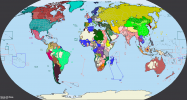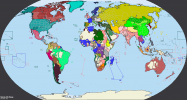A request based on
this DBWI, for
@Whiteshore
Hat tip to Sregan, for some names for Muslim colonies.
In this world, Europe had a worse time of it, East Asia and the Middle East doing better. The Arabs got rather naged to pfurther into France/Gaul before being pushed back and the Carolingians failed to flourish, a Holy Roman Empire of sorts grew even larger than OTL but only managed to get more attention from the steppe nomads, invading Turks leagued under what we would call Uzbeks, and a bit later Mongols and their steppe buddies would ravage their way as far as the Rhine. [1] The Spanish reconquista started later and never quite got that momentum going. Although Europe had a brief cultural renaissance for a while, with Hanseatic proto-republicanism flourishing even more than OTL, and an independent Flanders having a nice little commercial empire of its own, the *Reformation when it came was furiously apocalyptic, spread further (to Poland and Hungary, for starters) and in the face of a weaker Catholic church, soon began to turn on itself, splitting into multiple hostile branches which fought amongst themselves even more vigorously than they fought the Catholics.
Only in Byzantium, unbothered by crusaders and hit more lightly be Turkish invasions filtered through an earlier revival of Iranian power (their equivalent of Manzikert was a smashing success) managed to keep it's shit together, and when the Arabs and Iranian nations managed to pull off a scientific revolution, kept an eye on these developments and managed to eventually duplicated them. (The Door of Inquiry in Islam never was closed, the Persians invented the printing press for non-holy Farsi documents, and Baghdad avoided a sack, although the Arab Caliphate eventually moved its capital to more centralized and secure Cairo.) The Islamic world eventually pulled off a slow-motion and oil-fueled industrial revolution, and the Byzantines followed not long after.
Meanwhile, China remained mostly divided into two and sometimes three states, and the southern Chinese increasingly turned to the sea, and thanks to some efforts by wacky Buddhists to discover the Land of Immortality, North America was discovered. Settlement was limited at first, and there was trade (germs, but also valuable old world tech and farm animals), but then gold was discovered in California, and there was an emperor eager to balance the budget. Meanwhile, rumors of the new continent reached the Islam world, and Al-Andalus, which had already learned to sail around the bulge of Africa to cut out some middle-men in the gold trade, decided to take a look...
The Arabic Caliphate and Iran remain the most scientifically developed nations in the world, although Rhomania and South China aren't too far behind, and in any case the east Asians are beginning to eat their lunch in commercial manufacturing. Iran (generally still known abroad as "Persia" here) is more or less a constitutional monarchy, as is Al-Andalus, while the Caliph in Cairo still has some real power, and Arabic society generally more authoritarian, although nowadays nobody objects to women doctors, let alone drivers, and it's been a while since the traditional hand-chopping technique as been applied to thieves. (In the Muslim world are what we would call republics, but a republic is called a "consultative Ummah" here and arises from rather different antecedents than OTL western republic, one of the fundamental ideas being the notion of a "nation of laws, not men" - an end to the arbitrary and often unlimited power of traditional monarchs.)
East Asia is often more authoritarian, with North China being a nasty mix of genteel fascism, technocracy and Confucian absolutism, and while south China is in many ways a Land of Opportunity, politics tend to be dominated by the great commercial clans. The Japanese elite is about as arrogant as the French elite (in timelines where Napoleon succeeded in establishing his empire and his descendants went on to conquer the world.)
Islamic Africa is more backwards than the nations to the north, something of a "Latin America" to this Earth's "first world", although its problems have rather different antecedents. As yet no sub-Saharan African nation is considered a genuine "Great Power", although some, notably Oyo, are expected to get there before that much longer. South America is mostly Andalucian-African in the east, and pretty modern if not always very democratic (the vote of someone of slave descent isn't worth much in Maghred-the-Furthest), rather mixed (Andalucian-Amerindian-East Asian) in the *Colombia-*Ecuador region, and Islamicized Amerindians in the Andes going south. *Mexico is still spiritually scarred by the era of plagues and the longer era of Chinese meddling, and is unpredictable. (Fusang Chinese frequent talk about putting up a wall or intervening on part of the occasionally scapegoated 11% of East Asian descent doesn't help). The United Domains of Fusang itself is a continent, a world unto itself, a semi-democratic semi-Confucianist state with a Utopian Buddhist streak and a City on a Hill attitude, still growing steadily in population and wealth, and many worry - or, in some cases, hope for - what may happen when and if it throws aside it's traditional isolationism.
Europe is backwards and underdeveloped, save for Rome-in-the-east , which is full up to east Asian and Islamic standards of modernity, and has managed to almost pull up it's allies of Dacia [2] and *Georgia to it's own level. A bit of bright spot are the Mediterranean Latin states, which are generally "middle income nations", having seen some prosperity and growth as labor pools for more advanced nations (see OTL Indonesia) and while there are only a couple actual democracies in the bunch, the oligarchies and traditional monarchies/principalities aren't too awful. There has been talk of political unification of sorts, or at least closer integration, but this sort of talk is strongly disapproved of by the kingdom of France (a functional monarchy about as authoritarian as OTL Jordan), Al-Andalus, which is allergic to the notion of large Christian states with a foothold over the Pyrenees, and the battered but still holding it together theocracy of the Papal Estates, which sees any unification of its Latin neighbors as an existential threat to its existence. (There are also quite a few areas under the control of said neighbors the Popes are quite irredentist about).
The North and center are mostly juntas, one party autocracies, or near-absolute monarchies, in places (such as Not Poland) where things currently aren't in a state of (Holy) civil war. The German Confederation used to be something of an interesting case, a local dictator taking over from the military junta that had roughly unified the wreck of the old holy Roman Empire after the last imperial election had gone entirely pear-shaped. Uniting small states into larger "traditional" states, crushing the more resistant Protestant groups, suppressing localism and autonomism, in his 40 years reign he did much to push the Confederation into actual industrial nation status, and made "Eisenism" (much of which was actually inspired by the brutal practices of the Steel Khanate) an ideal in the eyes of many dictators of backwards nations. Unfortunately, his heir, in spire of his best efforts to train him, proved less competent than his father and foolishly invaded North Italy on the basis that Italy used to be part of the Holy Roman Empire and it therefore belonged to the German Confederation. This triggered the wrath of the great powers, and the Confederation was occupied by forces from Al-Andalus, the Caliphate of Cairo, and the Tianxia north Chinese empire, eager to extend their influence.
A combination of conflicting goals, insufficient planning, ignorance of local conditions, and local religious fanaticism has turned the occupation into a total clusterfuck, and the Islamic powers have pulled out: less able to countenance the loss of face associated, the Chinese have remained. Attempts to use Divide and Rule with the various
Landers has not worked well outside of Austria, and has created several exciting new _local_ rebel groups. It makes it seem unlikely that Austria, Bohemia, Pomerania, etc. will ever form a single united nation again. (Bohemia is complicated: the local German rebels are in favor of a unified Germany, since they're outnumbered by the Bohemian Slavs, who are willing to collaborate with the Chinese, but only as long as they get a nation of their own. They also are pushing the Chinese to allow the survival of the so-far unrecognized Wendish state).
More worrying than the mess in Germany/nies, is the trend it illustrates: the increasing aggressive posture of north China/Tianxia on the world stage in general: their increasing fondness for "muscular" treatment of small states that annoy them, and more energetic pushing of "Harmonialism", [3] their authoritarian and undemocratic principles, wherever people are receptive. Meanwhile north Chinese megacorporations carry out cut-throat economic competition such as no "Socialist" superpower could manage, and they remain loudly determined to reunify China ( some alarmed observers whisper "no matter how many dead south Chinese this requires", and use words like "first strike") Even in Fusang they fund various "Chinese reunification" movements (never mind that most Chinese in the United Domains are of
south Chinese descent).
As a result they have managed to provoke a broad, non-ideological alliance of powers interested in containing them and protecting themselves from dominance either political or economic. (Although the more democratic members of the alliance do spend quite a bit of lung power condemning the spread of what they call "harmonious" government.) In turn Tianxia is gathering what allies it can, taking advantage of existing hostility where it exists, and generally making loud noises about efforts to encircle them and overshadow their place in the sun.
Currently only the Arab Caliphate, Persia, Rhomania, Nihon, the two Chinas plus Chinese Fusang, Al-Andalus (a few) and the Sultanate of Industan have nuclear weapons: quite a few countries are wondering if they want to get some for insurance, though.
[1] What would become known as the Steel Khanate ruled over Russia until mid-twentieth century, but they weren't really a traditional steppe empire anymore: the cavalry was of steppe raider stock, but so were the infantry officers, the air force, and the
armored cavalry.
[2] When Wallachia and Moldova united, it seemed a bit odd, not to mention disrespectful, to call themselves "Romania" when the Roman Empire (their ally) was
right there, so they went with a callback to their original (so-claimed) ancestors.
[3] currently the technocrats are the most influential faction under the Emperor Himself , and science and science education is being very robustly pushed. They are also are big on planning. Whether this will be good or bad in the long run is unclear: they certainly have a hell of a lot more computing power than the Soviets ever had, and they haven't meddled much with the mega-corporations - yet.)



